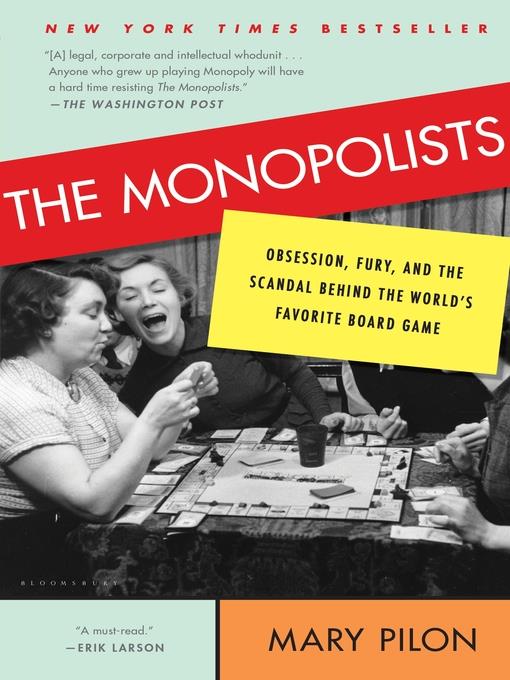
The Monopolists
Obsession, Fury, and the Scandal Behind the World's Favorite Board Game
کتاب های مرتبط
- اطلاعات
- نقد و بررسی
- دیدگاه کاربران
نقد و بررسی

Starred review from December 22, 2014
With more twists and turns than an Agatha Christie mystery, reporter Pilon reveals the tumultuous history of Monopoly, the iconic board game first created by Elizabeth Magie to draw attention to the economic theories of Henry George (a 19th-century politician and economist who advocated that land was not meant to be seized and couldn’t be owned). Pilon chronicles the game’s evolution through pop culture, including its crucial adoption by Quakers in Atlantic City, and the fervent players who modified the game to include local landmarks such as Ventnor Avenue and Boardwalk. The product then fell into the hands of an unemployed Charles Darrow, who patented it; Parker Brothers propagated his rags-to-riches story as though he were the originator of the game. To add to the drama, Pilon also relates the story of Ralph Anspach’s Anti-Monopoly, a game designed to present a different point of view, which Parker Brothers went out of its way to squash (including a very public burial of 40,000 copies of Anspach’s version). Dry concepts such as brand identity and copyright are deftly woven to create a compelling and seamless story that many readers will find more entertaining than the game itself. Agent: Deborah Schneider, The Gelfman Schneider Literary Agency.

December 15, 2014
In her debut, New York Times sports reporter Pilon deftly explores the origin of the Monopoly board game. For as much enjoyment and strategic suspense as the game inspires in its players, the author reports on its flip side: Monopoly's problematic, serpentine roots. Inventor Lizzie Magie, an outspoken Washington, D.C., stenographer and activist, based her "Landlord's Game" on personal progressive political views and those of 19th-century politician, economist and "magnetic leader" Henry George and his radical "single tax theory." Yet, as the author notes, Magie's name would soon become disassociated from the game. Charles Darrow, an unemployed salesman, would eventually take credit for Monopoly's creation with his own controversial appropriation of the game and, with its blockbuster success, rescue a near-bankrupt Parker Brothers Company. Pilon also explores the work of competitive Parker rival Milton Bradley, and she looks at later appropriations of Monopoly in the early 1930s. It's certainly surprising how Darrow and Parker Brothers were able to receive a patent for Monopoly "given the two Landlord's Game patents that had come before it." Sketchier still were Parker Brothers swift payoffs to creators of pre-Darrow Monopoly game incarnations (including Magie). However, the intrigue and litigious melodramatics hardly end there, as more questions on the authenticity of Parker's version of the game continued to surface. Pilon invests this surprisingly contentious chronicle with a dynamic mix of journalistic knowledge and subtle wit, adding a compelling chapter on a San Francisco economics professor's invention of the "Anti-Monopoly Game," which drew the ire of Parker Brothers and incited even more antagonistic trademark-infringement lawsuits. Contemporary gamers interested in exploring the early genesis of their pastime will find Pilon to be a readable, entertaining tour guide. A fascinating, appealingly written history of an iconic American amusement.
COPYRIGHT(2014) Kirkus Reviews, ALL RIGHTS RESERVED.

February 1, 2015
Board games connote innocent entertainment, but journalist Pilon's social history of Monopoly reveals a less-benign chronicle of power, deception, and avarice, and a tale of small vs. mighty, in which the righteous do not always prevail. Separated by 70 years, its two protagonists each invented a game as a vehicle to broadcast economic beliefs, and both found themselves at odds with the powerful game company Parker Brothers. Monopoly's invention was long ascribed to one Charles Darrow, but its direct antecedent was the brainchild of feisty activist, feminist, inventor, and poet Lizzie Magie, an adherent of antimonopolist economist Henry George. In the early 1900s, Magie created The Landlord's Game as an instructive political statement and an amusement. In the 1970s, economics professor and activist Ralph Anspach developed his own didactic board game called Anti-Monopoly. Targeted by Parker Brothers, Anspach fought back, unearthing the hidden past here rounded out by Pilon. Readers may want a scorecard to manage the large cast of players, particularly during the journey of the early game from Lizzie Magie to Charles Darrow via utopians in Delaware, fraternity brothers at Williams College, and Quakers in Atlantic City. VERDICT Thoroughly researched and deftly paced, this fascinating narrative is at once legal thriller, folk history, underdog story, and expose of corporate greed, and deserves a wide readership among fans of Monopoly, critics of monopoly, and all who enjoy a good story well told.--Janet Ingraham Dwyer, State Lib. of Ohio, Columbus
Copyright 2015 Library Journal, LLC Used with permission.

























دیدگاه کاربران